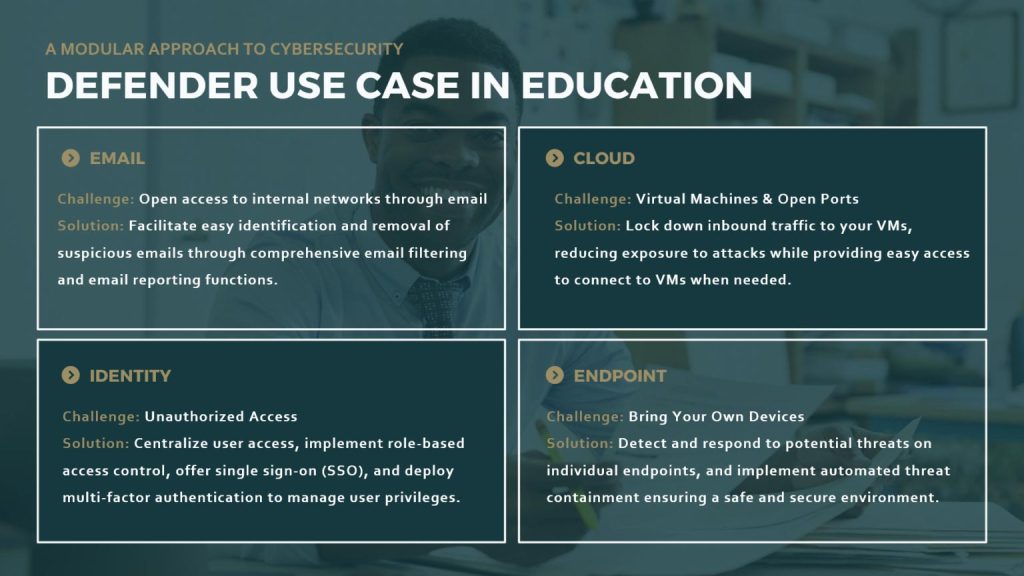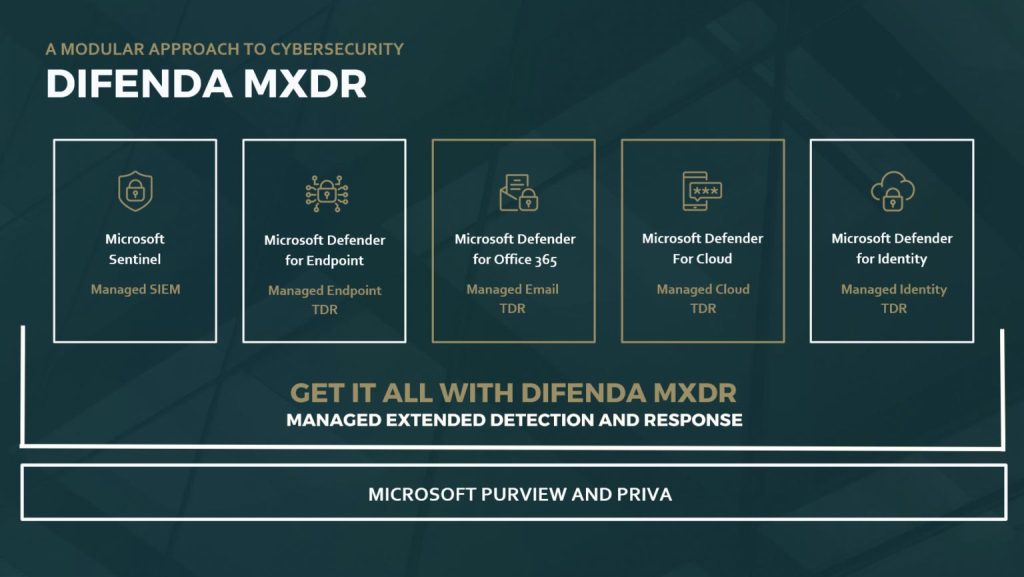
In a recent webinar, Difenda’s cybersecurity experts teamed up with Microsoft Security to discuss how you can overcome common cybersecurity challenges in the education sector and understand what is possible with your licensing capabilities. They covered the current landscape, changing regulatory requirements across Canada and the steps your school should take to protect your cloud environment and email networks with different user personas.
Below are some key takeaways from the event.
The Current Cybersecurity Landscape in the Education Sector
The education sector has become a prime target for cybercriminals, as evidenced by the 17% increase in security incidents experienced last quarter. Educational institutions face a range of threats that can compromise their systems, networks, and sensitive data. One of the most prevalent threats targeting educational institutions is ransomware and phishing attacks. But why is the education sector being targeted?
Educational institutions are targeted by cybercriminals due to several reasons. The presence of sensitive student data makes them attractive targets for illicit purposes. The decentralized nature of educational environments, with multiple departments, research firms, alumni networks, and faculty members, creates various access points and potential weak links. This complexity provides opportunities for cybercriminals to exploit and gain unauthorized access to sensitive information. Combined with limited cybersecurity resources which pose challenges in implementing robust security measures, cybercriminals find it easier to exploit these vulnerabilities.
Additionally, the large and diverse user base within educational institutions increases the potential for human error. Students, faculty, and staff may unknowingly engage in risky behaviour such as clicking on malicious links, downloading infected files, or falling victim to social engineering tactics. The scale of users and the reliance on technology for educational purposes make it challenging to maintain a high level of cybersecurity awareness and prevent human-related security incidents.
Educational institutions are facing a wide range of challenges, including the looming pressure to improve their security posture while meeting changing regulatory requirements.
Changing Regulations in the Canadian Education Sector: Quebec Bill 64
The education sector in 2023 has faced a significant challenge with the introduction of Quebec’s Bill 64, also known as Law 25. This legislation has brought about changes to privacy laws in Quebec, with a focus on enhancing individual rights, imposing stricter consent requirements, and establishing robust data governance frameworks. In compliance with the law, educational institutions are now required to appoint a privacy officer, report cybersecurity breaches, implement company-wide privacy policies, and establish transparent consent systems within their school systems.
What makes this development even more noteworthy is that provinces like Ontario, British Columbia, and Alberta have indicated their intention to introduce similar legislation. This means that educational institutions across Canada will need to adapt and establish agile security programs that can effectively navigate these evolving policies.
At Difenda, we recognize the importance of staying informed about regulatory changes and ensuring that our customers are aware of them as well. We take a proactive approach in prioritizing cybersecurity posture maturity and agility. One of Microsoft’s focuses is on developing products and solutions that support educational institutions in meeting these regulatory requirements and maintaining a strong cybersecurity stance. By doing so, we aim to empower the education sector in Canada to effectively address the evolving landscape of privacy and security regulations.
Become cybersecurity resilient today! Schedule some time to discuss how we can help you.
Microsoft Defender for Cloud for the Education Sector
Microsoft Defender for Cloud extends the concept of Extended Detection and Response (XDR) beyond just desktop environments. While many education customers have experienced the benefits of XDR in the desktop space through tools like Microsoft Defender for Endpoint and Defender for Identities, it’s important to recognize the significance of security signals at the server level.
Defender for Cloud is a comprehensive collection of services designed to provide Extended Detection and Response (XDR) for various cloud-based assets such as servers, databases, and storage. In the realm of IT, servers hold critical data that intertwines privacy and security concerns. As educational institutions have repositories of valuable data on their servers, it becomes essential to protect this data at its source. Microsoft Defender for Cloud enables educational organizations to safeguard their server-level data, providing comprehensive security solutions that address both privacy and security requirements. The goal is to not only manage these services but also to surface data on how well they align with best practices and guidance.
Defender for Cloud offers full stack protection regardless of where the services are hosted, making it a comprehensive hybrid services ecosystem. With its array of services and integrations, Defender for Cloud provides better signals, improved security, and the ability to automate security responses, empowering organizations to protect their cloud-based assets effectively.
Learn more about Microsoft Defender for Cloud.
4 Use Cases for Microsoft Defender in Education

Discover more use cases to help build your business case here.
Leveraging A Modular Approach to Cybersecurity in Education
Many educational institutions have already invested in E5 or A5 series subscriptions, which serve as a crucial foundation for a strong security posture. But, many of these organizations are not utilizing the tools and capabilities that they have invested in. At Difenda, we specialize in meeting you where you are in your cybersecurity journey to activate your tools and licensing capabilities effectively. By turning on the technology you invested in, we can enhance your response capabilities and provide better visibility.
How can we do that? Difenda takes a modular approach to cybersecurity, offering flexible solutions that cater to organizations based on their specific needs. We understand that each organization is at a different stage in its technology, people, and process journey, as well as having unique goals and requirements. That’s why our MXDR service is designed to be broken down into different areas, allowing you to purchase and implement them as you grow.

We leverage powerful Microsoft technologies such as Sentinel, Defender for Endpoint, Defender for Office 365, Defender for Cloud and Defender for Identity. Our goal is to ensure you take full advantage of these capabilities, empowering your organization to effectively detect, respond to, and mitigate cybersecurity threats. The strong partnership and alignment with Microsoft’s ecosystem is a key factor that enables us to deliver top-quality services and solutions.
Additionally, an often-overlooked aspect of cybersecurity is privacy. Labelling and classifying assets and understanding where your data resides are vital components of a strong cybersecurity posture. By incorporating Microsoft’s expertise in privacy with Microsoft Purview and Priva, we can provide use cases that help you accurately label and classify and manage information, giving you a significant advantage in threat detection and response.
Learn more about Difenda MXDR here.


